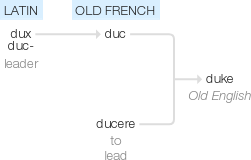Duke
Old English (denoting the ruler of a duchy), from Old French duc, from Latin dux, duc- ‘leader’; related to ducere ‘to lead’.
wiktionary
From Old French duc, through Middle English duk, duke, from Latin dux, ducis. Displaced native Old English heretoga. Was present as duc in late Old English, from the same Latin source. Doublet of dux and doge.
The “fist” sense is thought to be Cockney rhyming slang where “Duke(s) of York” = fork. Fork is itself cockney slang for hand, and thus fist. [1]
etymonline
duke (n.)
early 12c., "a sovereign prince," from Old French duc (12c.) and directly from Latin dux (genitive ducis) "leader, commander," in Late Latin "governor of a province," from ducere "to lead," from PIE root *deuk- "to lead." It is thus related to the second element in German Herzog "duke," Old English heretoga.
Applied in English to "hereditary nobleman of the highest rank" probably first mid-14c., ousting native earl. Also used to translate various European titles (such as Russian knyaz), usually of nobles ranking below a prince, but it was a sovereign title in some small states such as Burgundy, Normandy, and Lorraine.
duke (v.)
"to hit, strike with the fist," by 1952, slang, from dukes. Related: Duked; duking. To duke it out "fight with fisticuffs" is by 1971.
